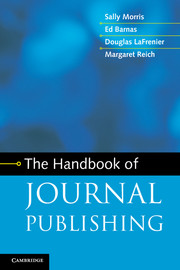Book contents
- Frontmatter
- Contents
- Preface and acknowledgments
- 1 Introduction to journals
- 2 Managing journals
- 3 Editing
- 4 The production process
- 5 Journal metrics
- 6 Marketing and sales
- 7 Fulfillment
- 8 Journal finances
- 9 Subsidiary income
- 10 Contract publishing
- 11 Copyright and other legal aspects
- 12 Ethical issues
- 13 The future of scholarly communication
- Appendix 1 Glossary
- Appendix 2 Resources
- Appendix 3 Vendors
- Index
- References
2 - Managing journals
Published online by Cambridge University Press: 05 March 2013
- Frontmatter
- Contents
- Preface and acknowledgments
- 1 Introduction to journals
- 2 Managing journals
- 3 Editing
- 4 The production process
- 5 Journal metrics
- 6 Marketing and sales
- 7 Fulfillment
- 8 Journal finances
- 9 Subsidiary income
- 10 Contract publishing
- 11 Copyright and other legal aspects
- 12 Ethical issues
- 13 The future of scholarly communication
- Appendix 1 Glossary
- Appendix 2 Resources
- Appendix 3 Vendors
- Index
- References
Summary
Introduction – what is management?
Management is the process of gathering a team of people to work together in order to accomplish a desired goal both effectively and efficiently with available resources. The effective manager does not need to know every detail of the process involved in attaining the goal; rather, he or she must know what needs to be done, who knows how to do it, what resources are needed, and how to get everyone to work together to get the job done.
It has been said that we learn to manage by the way we have been managed. While we all may consciously emulate aspects of the style of managers we admire and avoid the style of those we do not, it is important to recognize that we may have unconsciously absorbed other aspects of their management approach, of which we are unaware. Anyone aspiring to management should consider taking a basic management course, or at least read a basic management text (see “Further reading” at the end of this chapter), in order to gain an overview of what is entailed in managing a project and to be exposed to a variety of management methods.
While much has been written about the science of management, there is a large component of art involved as well. Some aspects can be taught, but others are best learned by observation and practice. One of these is the ability to recognize the strengths (and weaknesses) of the individuals in the team; another consists of learning how best to get each person to “buy in” to the goal and work together with the rest of the team. Two additional interpersonal skills are essential: (1) knowing when to leave someone alone to do a job and when to intervene to get the job done and (2) knowing how to be an effective buffer between your staff and your own manager, allowing each to concentrate on the task at hand and not to interfere unduly with each other.
- Type
- Chapter
- Information
- The Handbook of Journal Publishing , pp. 28 - 74Publisher: Cambridge University PressPrint publication year: 2013



